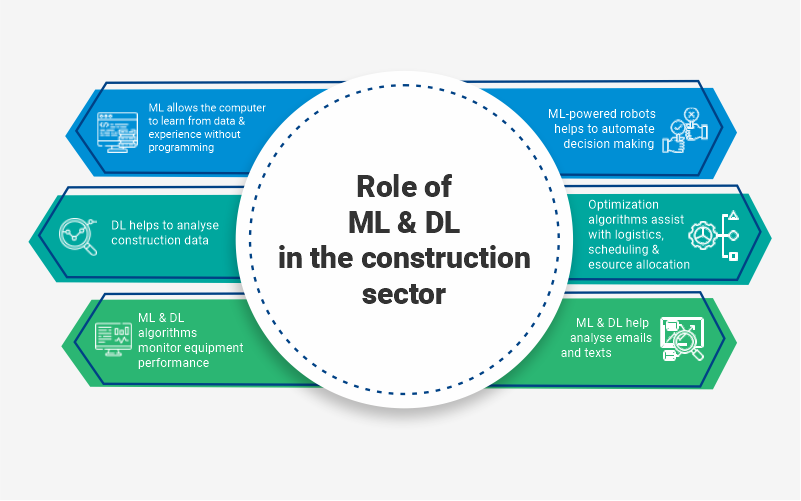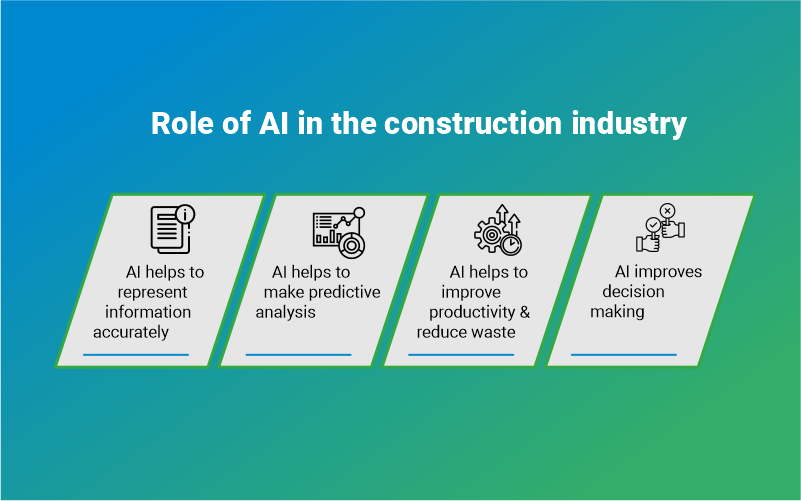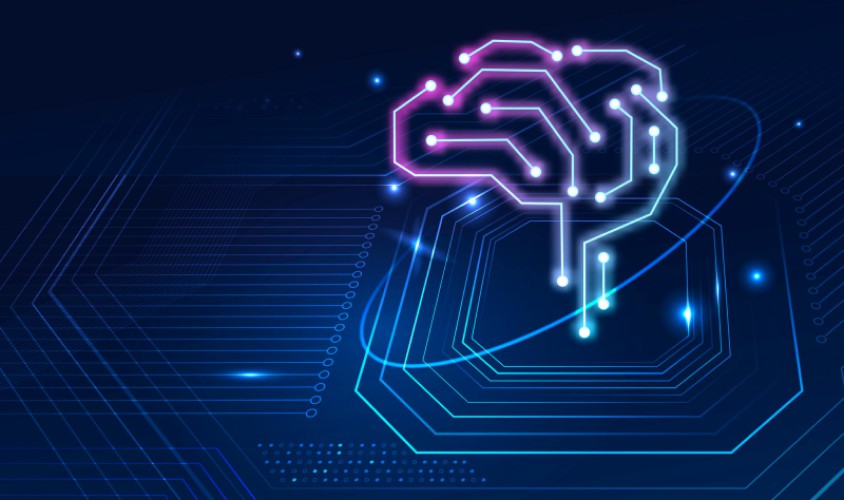Construction is considered to be one of the most challenging industries for artificial intelligence and machine learning adoption. This has been due to several reasons such as fragmented data, manual and unstandardized processes, and stringent safety regulations. However, AI, deep learning and ML are transforming the construction industry. From predictive maintenance to cost-estimation modelling, these technologies are improving our ability to design, build, predict, and analyze new solutions. Let’s take a look at how AI deep learning and machine learning are changing the construction industry.
Machine Learning and Deep Learning in Construction

Machine learning and deep allow computers to learn from data and experience without being programmed. With enough observations, computers can find patterns and make predictions. The learning process is automated, requiring little to no human input. ML and DL algorithms are used to analyze huge amounts of construction data, such as equipment utilization, productivity, and building conditions. ML can also be employed to optimize scheduling, project management, and resource allocation. The following are some of the ways in which DL and ML are used in construction:
Predictive Maintenance
ML and DL algorithms can monitor equipment performance and flag any potential issues before they result in costly downtime.
Autonomous Decision Making
Robots can be programmed to make decisions autonomously to improve worker safety and reduce costs.
Optimization
Optimization algorithms are used to find the best ways to perform activities such as logistics, scheduling, and resource allocation.
Natural Language Processing
Machine and deep learning NLP can be used to analyze unstructured data such as emails and texts to unearth insights.
AI in construction

A computer algorithm is considered to be artificial intelligence when it exhibits the following characteristics:
Representation
It can represent information in an understandable way.
Reasoning
It can draw conclusions and make predictions based on the information representation.
Adaptability
It can modify its actions as per the changing circumstances.
Learning
It can learn from past experiences and modify its behaviour as a result.
Goal-Directedness
It can set goals and act in ways that achieve the goals.
Construction AI systems can be categorized as follows:
Predictive Analysis
Predictive analysis is the practice of using historical data to make predictions about the future. Predictive analysis can be applied to many aspects of construction such as estimating, scheduling, and project management. AI is used to analyze and draw predictions about future events.
Autonomous Robotics
Robotics are used extensively in construction to execute repetitive tasks, improve productivity, and reduce waste.
Decision Making Systems
AI systems that make decisions autonomously are being developed in construction to address issues such as safety, regulatory compliance, and productivity.
Hybrid Systems
Hybrid systems are a blend of AI and traditional computer programming. Hybrid systems combine the best of both worlds, making them suitable for real-life applications.
Benefits of AI and ML in Construction
Ease of Access
Construction data has historically been fragmented and unstandardized, making it difficult to use. AI and ML technology has enabled the creation of a centralized system, enabling easier access to data.
Accuracy
Computer algorithms can be more accurate than humans when it comes to complex calculations and predictions.
Automation
AI and ML are increasingly being used to automate manual tasks that do not require human intervention. This is done through robotics and autonomous decision-making systems.
Cost-Savings
AI and ML are expected to save the construction industry by cutting out overhead expenses.
Limitations of AI and ML in Construction
Downtime
While AI solutions can reduce downtime due to faulty equipment, they are not fail-proof. When an AI system fails, it can lead to long downtimes.
Potentially Inaccurate Predictions
AI systems make predictions based on historical data, which can result in inaccurate predictions in the future.
Lack of Expertise
AI systems are only as good as their creators. If the system is not designed or implemented properly, it will not perform optimally.
Privacy and Security Issues
As more construction data is stored online and accessed through cloud computing, it is at risk of being hacked.
Algorithm Design
Different algorithms have different strengths and weaknesses. A construction company should choose an algorithm based on the problem at hand.
Risk of Automation
AI systems can replace human operators. While AI can perform tasks more accurately than humans, human oversight and intervention are necessary for critical tasks.
Lack of Creativity
AI can only find solutions that are programmed into the system. AI cannot be creative and generate new and innovative solutions.
Key Takeaway
Artificial intelligence and machine learning are transforming the construction industry by improving project management, resource optimization, and safety. Predictive analysis and autonomous robotics are examples of AI applications. With construction AI systems, you can reduce downtime, improve accuracy, and increase cost savings. But, you must ensure that you design the system properly and that it is implemented properly as well.
About Author
Olivia Jones
Technology Specialist
Olivia is a highly skilled and experienced Technology Specialist with 10+ years of hands-on expertise in the rapidly evolving field of technology. She has a proven track record of successfully implementing and managing a wide range of technological solutions, ensuring optimal performance and efficiency. Olivia possesses a deep understanding of industry trends and emerging technologies, enabling her to provide strategic guidance and drive innovation within organizations. With a strong focus on problem-solving, she consistently delivers tailored solutions that align with business objectives while maximizing productivity and cost-effectiveness.
About SoftTech Engineers
A leading IT company (www.softtech-engr.com) facilitating business and technology transformation across the AEC industry through innovative software products and solutions. Equipped with 25+ years of deep domain expertise and industry knowledge, SoftTech has helped more than 4500 clients & government organizations, with more than 25000 users in India and around the world to gain a competitive edge and lead from the front in the industry.

